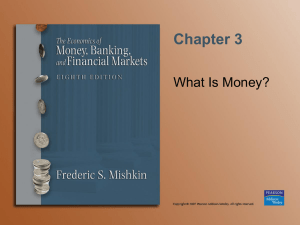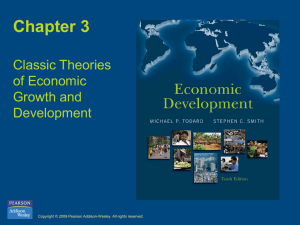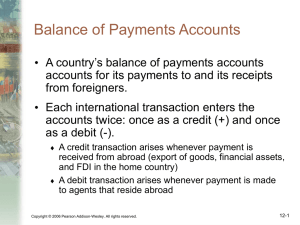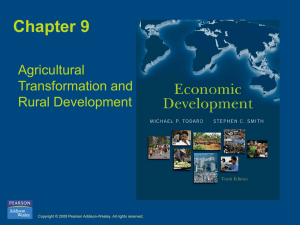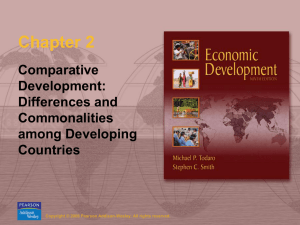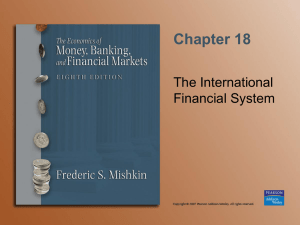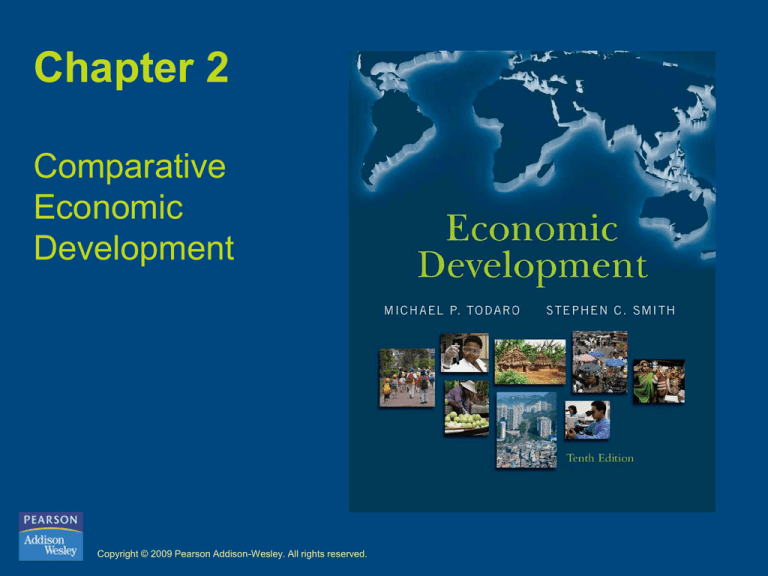
Chapter 2
Comparative
Economic
Development
Copyright © 2009 Pearson Addison-Wesley. All rights reserved.
Country Classifications
World Bank ranks countries on GNI per capita
•
•
•
•
•
Low Income Countries (LIC)
Low Middle Income Countries (LMC)
Upper Middle Income Countries (UMC)
High Income Countries (HIC)
Organization for Economic Cooperation and
Development (OECD)
Copyright © 2009 Pearson Addison-Wesley. All rights reserved.
2-2
Classification of Economies by Region
and Income in 2007
Copyright © 2009 Pearson Addison-Wesley. All rights reserved.
2-3
Classification of Economies by Region and
Income, 2007
(Latin America and the Caribbean)
Copyright © 2009 Pearson Addison-Wesley. All rights reserved.
(Sub-Saharan Africa)
2-4
Classification of Economies by Region and
Income, 2007
Copyright © 2009 Pearson Addison-Wesley. All rights reserved.
2-5
Nations of the World, Classified by
GNI Per Capita
Copyright © 2009 Pearson Addison-Wesley. All rights reserved.
2-6
Measuring Development
• Gross National Income (GNI)
• Gross Domestic Product (GDP)
• Purchasing Power Parity (PPI): method
instead of exchange rates as conversion
factors
Copyright © 2009 Pearson Addison-Wesley. All rights reserved.
2-7
Income Per Capita in Selected
Countries
Copyright © 2009 Pearson Addison-Wesley. All rights reserved.
2-8
Comparison of Per Capita GNI, 2005
Copyright © 2009 Pearson Addison-Wesley. All rights reserved.
2-9
Basic Indicators of Development
• Health Conditions
• Life Expectancy
• Education Achievements
• Human Development Index (HDI): a composite
measure of living standards
Copyright © 2009 Pearson Addison-Wesley. All rights reserved.
2-10
Commonality and Diversity:
Some Basic Indicators
Copyright © 2009 Pearson Addison-Wesley. All rights reserved.
2-11
Human Development Disparities
Copyright © 2009 Pearson Addison-Wesley. All rights reserved.
2-12
Human Development Disparities
Copyright © 2009 Pearson Addison-Wesley. All rights reserved.
2-13
Human Development Index:
23 Countries, 2004
Copyright © 2009 Pearson Addison-Wesley. All rights reserved.
2-14
Human Development Index:
23 Countries, 2004
Copyright © 2009 Pearson Addison-Wesley. All rights reserved.
2-15
Human Development Index Variations:
Similar Incomes, 2004
Copyright © 2009 Pearson Addison-Wesley. All rights reserved.
2-16
Common Characteristics of LDCs:
1. Lower levels of living and productivity
2. Lower levels of human capital investment
(health-care, education, skills)
3. Higher levels of income inequality and
poverty
4. Higher population growth rates
Copyright © 2009 Pearson Addison-Wesley. All rights reserved.
2-17
Shares of Global Income, 2005
Copyright © 2009 Pearson Addison-Wesley. All rights reserved.
2-18
Most and Least Populated Countries
and Their Per Capita Income, 2005
Copyright © 2009 Pearson Addison-Wesley. All rights reserved.
2-19
Child Mortality Rates, 1990 and 2005
Copyright © 2009 Pearson Addison-Wesley. All rights reserved.
2-20
Primary School Enrollment and
Pupil-Teacher Ratio
Copyright © 2009 Pearson Addison-Wesley. All rights reserved.
2-21
Correlation between Child Mortality
and Mother’s Education
Copyright © 2009 Pearson Addison-Wesley. All rights reserved.
2-22
People Living in Poverty, 1981-2002
Copyright © 2009 Pearson Addison-Wesley. All rights reserved.
2-23
Common Characteristics of LDCs:
5. Greater social fractionalization
6. Larger rural population, but
rapid rural-urban migration
7. Lower levels of industrialization and
manufactured exports
8. Adverse geography and resource endowment
Copyright © 2009 Pearson Addison-Wesley. All rights reserved.
2-24
Urban Population in LDCs
Copyright © 2009 Pearson Addison-Wesley. All rights reserved.
2-25
Share of Population Employed in Industry
2000-2005 (%)
Copyright © 2009 Pearson Addison-Wesley. All rights reserved.
2-26
Common Characteristics of LDCs:
9. Underdeveloped financial and other markets
– Imperfect markets
– Incomplete information
10. Colonial legacy and external dependence
–
–
–
–
Institutions
Private property
Personal taxation
Taxes in cash rather than in kind
Copyright © 2009 Pearson Addison-Wesley. All rights reserved.
2-27
LDCs Today vs. MDCs Then
1. Physical and human resource endowments
2. Per capita incomes and levels of GDP
3. Climate
4. Population size, distribution, and growth
Copyright © 2009 Pearson Addison-Wesley. All rights reserved.
2-28
LDCs Today vs. MDCs Then
5. Historic role of international migration
6. International trade benefits
7. Scientific innovation & technological advancement
8. Effectiveness of domestic institutions
Copyright © 2009 Pearson Addison-Wesley. All rights reserved.
2-29
Convergence?
• The closing economic and technological
gaps between LDCs and MDCs?
• Evidence of unconditional convergence is
hard to find
• Per capita income convergence?
Copyright © 2009 Pearson Addison-Wesley. All rights reserved.
2-30
Convergence in OECD
Divergence in the World
Copyright © 2009 Pearson Addison-Wesley. All rights reserved.
2-31
Per Capita GDP Growth in LDCs,
1995-2005
Copyright © 2009 Pearson Addison-Wesley. All rights reserved.
2-32
Growth Convergence and
Income Convergence
Copyright © 2009 Pearson Addison-Wesley. All rights reserved.
2-33

